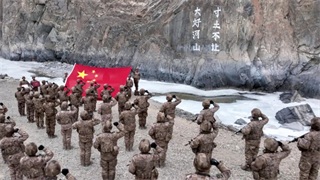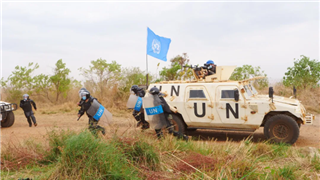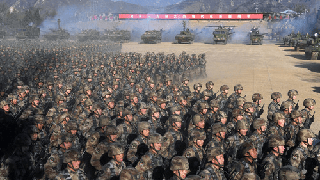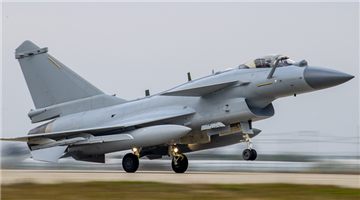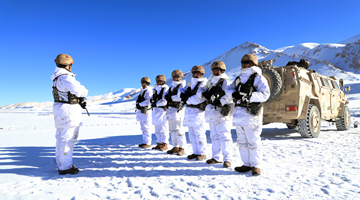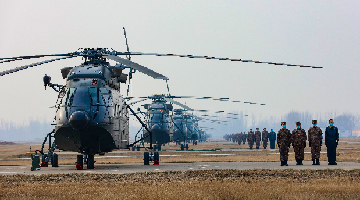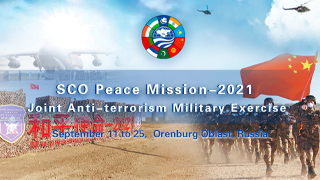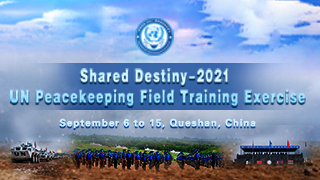张丹
By Zhang Dan
1月10日,俄美两国在瑞士日内瓦就核军备控制和因乌克兰引发的紧张局势进行磋商,这是双方领导人去年6月确立战略稳定对话机制后举行的第三轮会晤。新年伊始,俄美为管控安全风险举行的新一轮对话值得欢迎,但分析人士普遍认为,双方分歧“没有快速解决方案”,俄美关系的紧张局面仍将持续。
Russia and the US held a meeting in Geneva, Switzerland on January 10 discussing nuclear arms control and the tension stemming from the Ukraine issue – the third meeting between the leaders of the two countries after they established the mechanism of strategic stability dialogue last June. The new round of dialogue held at the beginning of a new year aimed at controlling security risks is much welcomed, but analysts generally believed there was no quick solution to their divergences and the strained Russia-US relations will sustain.
分歧矛盾短期难解
Divergences and conflicts to persist
从俄美双边对话的议题不难看出,双方的核心矛盾聚焦在核军控、乌克兰等问题上。这种矛盾与分歧是根本性和战略性的,难以在短期内化解。
The topics at the dialogue show that the core conflicts between Moscow and Washington lie in nuclear arms control and the Ukraine issue, but their fundamental and strategic nature decides that they won’t be resolved in the short term.
俄美《中导条约》失效后,《新削减战略武器条约》成为两国间唯一的军控条约。两国去年2月商定,将该条约有效期延长5年。双方都有意利用这5年时间达成一个新的军控条约。
With the Intermediate-Range Nuclear Forces Treaty (INF Treaty) coming out of effect, the Strategic Arms Reduction Treaty(New START) is now the only arms control treaty between the two powers and will be extended for another five years according to the agreement reached last February. Both sides intend to reach a new arms control treaty during this period.
在军控问题上,俄美有不同考量:美国担心俄罗斯的战术核武器以及正在研发的新型武器系统,如核动力鱼雷等;俄罗斯则担心美国的导弹防御系统和常规精确打击武器的能力。在涉核问题上的立场差异,增加了双方军控谈判的难度。
Moscow and Washington have different calculations when it comes to arms control. While Washington is concerned about Moscow’s tactical nuclear weapons and the new weapon systems in the pipeline such as nuclear-powered torpedo, Moscow worries about Washington’s missile defense system and conventional precision strike capabilities. Their different stance on the nuclear issue has made arms control negotiations more difficult.
近来,俄罗斯与美国等西方国家围绕乌克兰问题关系持续紧张。以美国为首的北约企图通过强化军事合作等方式拉拢乌克兰,持续加大对俄罗斯的军事和政治围堵,并不断渲染俄罗斯“入侵”乌克兰的风险。俄方则强调局势持续恶化是因为北约不断挤压俄罗斯安全空间,多次明确划出“红线”。此外,在网络安全、人权、干预选举等问题上,俄美双方的分歧也非常突出。
In recent years, Russia has been in consistent tension with the US and other western countries because of the Ukraine issue. The US-led NATO tries to bring Ukraine to its side through intensified military cooperation and other means, and has kept ramping up military and political containment of Russia while hyping the risk of it invading Ukraine. Russia, on the other hand, has emphasized that the sustained aggravation of the situation is caused by NATO continuously squeezing its security space and it has drawn the “red line” several times. Besides, the two sides also have prominent divergences on cybersecurity, human rights, intervention in the election, and other issues.
可以预见,新一年美国不会停止对俄罗斯的围堵打压,这必将引起俄方的强烈反制。
It’s foreseeable that the US won’t stop its suppression and containment of Russia in the new year, and that will surely incur vehement reaction and countermeasures from the Russian side.
双方缺乏战略互信
More strategic mutual trust needed
长期以来,由于缺乏战略互信且存在结构性矛盾,俄美关系已“冰冻三尺”,短期内难以破冰。
For a long time, the Russia-US relation, due to their lack of strategic mutual trust and the structural conflicts, has been frozen so deep that an ice-breaking breakthrough doesn’t seem likely anytime soon.
过去一年,美国以俄罗斯涉嫌进行“网络袭击、干预美国大选”等为由,宣布对俄实施大规模制裁并驱逐俄外交人员;美国通过支持北约频繁在黑海地区军演、向乌克兰提供武器装备等方式,不断对俄施压和挑衅;继退出《反导条约》和《中导条约》后,美国又宣布退出《开放天空条约》,还试图帮助澳大利亚建造核潜艇,制造核扩散风险,冲击国际核不扩散体系,导致俄美军事信任基础越来越薄弱。
In the past year, the US announced massive sanctions against Russia and expelled Russian diplomats on the grounds of suspected “cyberattacks and intervention in American election”. It also made constant pressuring and provocative moves against Russia by supporting NATO’s frequent military exercises in the Black Sea region and providing weapons and equipment to Ukraine. After withdrawing from the Treaty on the Limitation of Anti-Ballistic Missile Systems (ABM) and the INF Treaty, the US went further to exit the Open Skies Treaty. It also tried to help Australia build nuclear-powered submarines, which will increase the risk of nuclear proliferation and send shock waves through the international nuclear non-proliferation system. All these have continuously eroded the foundation of military trust between the two countries.
俄美缺乏战略互信背后,是一系列历史原因。冷战后,美国希望将俄罗斯控制在西方的影响之下,反俄态度也是其国内政坛的主流。而俄罗斯一直认为,美国作为霸主的单极世界不可接受,美主导的北约东扩已经威胁到俄国家安全利益,美居高临下的态度更让俄无法接受。
There is a series of historical reasons behind the lack of strategic mutual trust between Washington and Moscow. After the Cold War ended, the US wished to keep Russia under western control and the anti-Russia sentiment was prevalent in domestic politics. On the other hand, Russia insists that a unipolar world with the US as the only hegemon is unacceptable, the US-dominated eastward expansion of NATO is threatening its national security interests, and America’s condescending attitude doesn’t help matters at all.
历史因素与现实利益冲突叠加,让俄美两国关系处于“旧伤未愈、又添新伤”的轮回中。2022年,俄美关系能否走出“冰河时代”值得进一步关注。
The superposition of historical factors and current conflicts of interests has added insult to injury in bilateral relations. Whether the two parties will break the ice and lead their relations to a new era in 2022 is worth watching.

